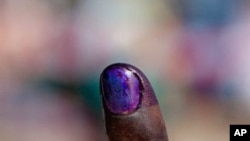Southern Sudanese refugees in neighboring Ethiopia are turning out in big numbers at referendum voting stations to express their feeling that independence is the road to a new life in their homeland.
At a voting center here the celebration has already begun. The voting will go on for several more days, but the outcome is a foregone conclusion for the hundreds of southern Sudanese who waited as this polling station opened Sunday morning.
Many waiting for their turn to cast a ballot were born in refugee camps. They have never seen their homeland.
Others, like 28-year old Chuol Chang Kier, are among the so-called 'Lost Boys,' orphans who were brought to safety in Ethiopia during Sudan's 21-year civil war. He predicts the vote in this diaspora polling center will be almost unanimous. He says he does not know a single person who wouldn’t vote for independence.
Arop Deng Kuol is head of the Government of Southern Sudan office in Ethiopia. He described the vote as a chance for southern Sudanese to use ballots instead of bullets to speak on behalf of those who died fighting for independence.
"It's a party because... 2 ½ million people have died for this day, and everybody is feeling happy because there's no more blood that will be shed, and there is no more struggle that the southern Sudanese will go for, they see it as a refund for all those who have died and sacrificed for the last 55 years for this day."
In stark contrast to the pandemonium outside, the scene inside the polling center was calm and orderly as, one by one, voters were given an explanation of how to mark their ballots.
Opiew Obang Kwot is the Southern Sudan Referendum Commission representative in Ethiopia. He says while everything is being done under the watchful eye of international observers to ensure the fairness of the vote, everyone is aware of the consequences of their choice.
"Today they are here to decide if they can say, now we can vote for unity, unity is good for us. But if they decide to say no, this time we suffer a lot because of unity and unity make our mother and father to die, so we don't want unity again, so they can decide what they can decide."
Government of Southern Sudan representative Kuol expressed the hope that the referendum would mark the end of the war for independence and the beginning of what he called 'the war for development' in what will be one of the world's least developed countries.
Sudan Independence Referendum Draws Large Refugee Turnout in Ethiopia




